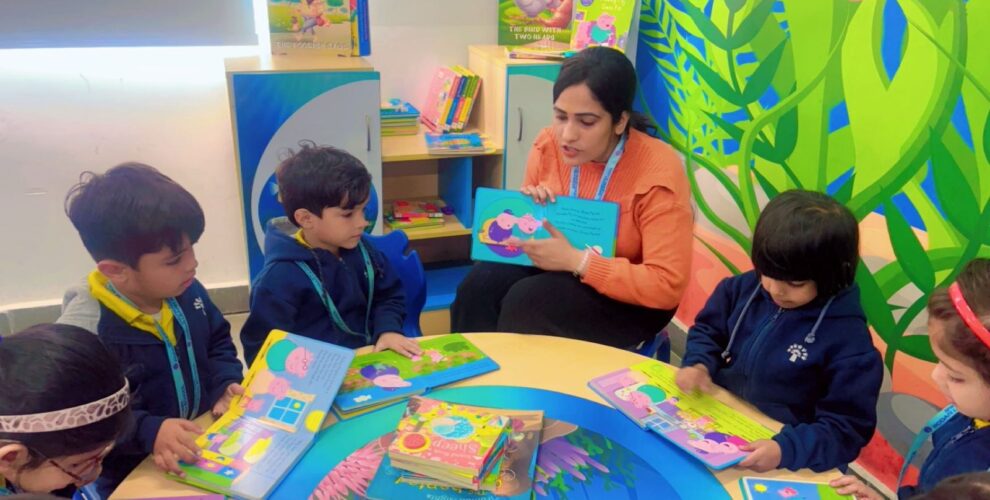How to Develop Early Reading Skills in Preschoolers?

” Children are made readers on the laps of their parents.” – Emilie Buchwald
” यथार्थ ज्ञान हि जीवनमुक्ति” (Yatharth Gyan Hi Jeevan Mukti)
“True knowledge is liberation from life.”
– Shrimad Bhagavad Gita (Chapter 4, Verse 36)
Fostering a Love for Reading in Preschoolers: A Catalyst for Cognitive, Emotional, and Social Development
Early reading skill is an indispensable skill that plays a pivotal role in a child’s cognitive, emotional, and social development. As a parent or educator, it is essential to instill a love for reading in preschoolers, laying the foundation for future academic success and a lifelong passion for learning.
Why Early Reading Skills Matter?
Reading is a fundamental skill that benefits preschoolers in numerous ways. Some of the reasons why reading is essential for preschoolers include:
1. Linguistic Development: Reading exposes children to novel vocabulary, complex sentence structures, and nuanced communication skills.
2. Cognitive Enhancement: Reading stimulates critical thinking, problem-solving, and analytical skills, thereby fostering cognitive development.
3. Emotional Intelligence: Reading helps children develop empathy, self-awareness, and social skills, thereby enhancing their emotional intelligence.
4. Academic Achievement: Reading skills are a robust predictor of future academic success, making them a crucial component of early childhood education.
Strategies for Developing Reading Skills in Preschoolers

Developing reading skills in preschoolers requires a synergistic approach that combines explicit instruction, practice, and playful activities. Here are some pragmatic strategies to get you started with Early Childhood Education Reading:
1. Create a Literate Environment: Surround your child with books, magazines, and other reading materials, and establish a daily reading routine.
2. Read Aloud with Gusto: Reading aloud to your child exposes them to novel vocabulary, complex sentence structures, and engaging storytelling techniques.
3. Foster Interactive Reading: Encourage your child to participate in reading by pointing to words, identifying pictures, and predicting what happens next.
4. Develop Phonological Awareness: Engage your child in games that involve rhyming, word families, and syllable counting to develop their phonological awareness.
5. Teach Alphabet Knowledge: Use songs, games, and hands-on activities to teach your child the alphabet, thereby developing their understanding of letter-sound relationships.
6. Introduce Sight Words: Introduce your child to common sight words, such as their name, family members, and basic vocabulary.
7. Make Reading a Joyful Experience: Incorporate games, puzzles, and activities that involve reading, such as matching games, scavenger hunts, and reading bingo.
8. Model Reading Behavior: Let your child see you reading for pleasure, thereby instilling a love for reading and demonstrating its value.
9. Provide Opportunities for Practice: Encourage your child to practice reading regularly, either independently or with guidance.
10. Celebrate Progress: Praise your child’s progress, no matter how small, to build their confidence and motivation to continue reading.
Additional Early Emergent Strategies for Educators

If you’re an educator, here are some additional strategies to develop reading skills in preschoolers:
1. Differentiate Instruction: Tailor your instruction to meet the diverse needs of your students.
2. Use Multisensory Approaches: Incorporate visual, auditory, and kinesthetic activities to engage students and promote learning.
3. Foster Student-Led Reading: Allow students to take turns reading to the class or in small groups.
4. Incorporate Technology: Utilize digital tools, such as e-books and reading apps, to make reading more engaging and accessible.
5. Collaborate with Parents: Communicate with parents and encourage them to reinforce early literary skills at home.
Conclusion
Developing emergent reading skills in preschoolers is a critical component of preschool education. By creating a literate environment, making reading interactive, and providing opportunities for practice, you can help your child or students develop a lifelong love for reading.
At Greater Noida Podar Learn School, we take immense pride in cultivating a culture of literacy, nurturing our students’ early childhood education reading to facilitate articulate expression and impeccable pronunciation. By doing so, we empower our Podarites to become adept communicators, equipped to convey their thoughts with clarity and conviction.
“विद्या ददाति विनयम्” (Vidya Dadati Vinayam)
“Knowledge gives humility.”
This Sanskrit shloka highlights the importance of knowledge and education in developing humility and a lifelong love for learning.
” A reader lives a thousand lives before he dies. The man who never reads lives only one.” – George R.R. Martin
Contact us for Admission Enquiries.

